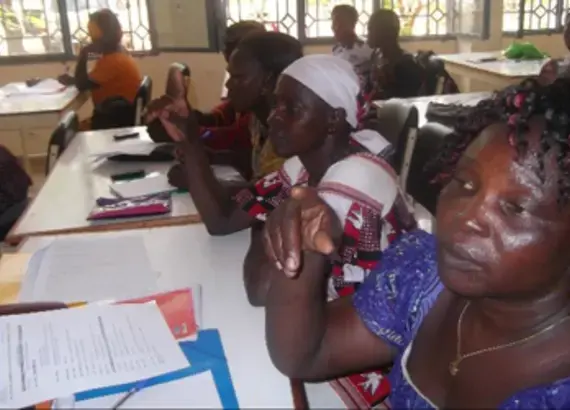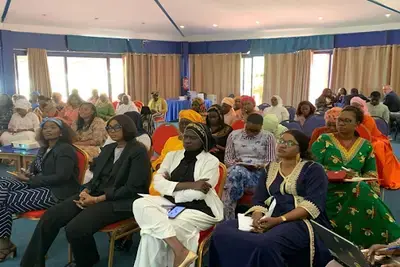
Success Story
Helping Women and Youth Be Competitive Candidates as Burkina Faso Vote Brings Political Transition to an End
On May 22, 2016, with the holding of local elections, Burkina Faso’s 19-month political transition came to an end. With 2.6 million of 5.5 million registered voters casting ballots (a participation rate of 47.65%), Burkinabe went to the polls to elect local councilors, who are responsible for government at the commune level and who will later convene to elect mayors from among their ranks.
With the aim of increasing women and youth representation in local leadership by making them more competitive candidates under a Swiss Development Cooperation-supported program, NDI trained a total of 1,049 women and youth who stood for election to become local councilors. At 20 trainings across the country – in Ouagadougou, Bobo-Dioulasso, Ouahigouya, Dédougou, Kaya, Dori, Tenkodogo and Gaoua – a total of 674 women and 405 youth candidates from 12 political parties and 5 independent groups benefitted from NDI’s training on how to speak about the issues and challenges linked to these elections, the processes of preparing, organizing, and managing an electoral campaign, and communications, public speaking and media relations.
“The training was very enriching, it allowed me to better understand the role that I can play in my community even if I am not elected.” - NDI Training Participant and Candidate in Local Elections

Participants at an NDI training in Burkina Faso for youth and women candidates act out door-to-door campaigning.
Feedback from the participants noted that they found the practical examples and sharing of experience with more seasoned participants allowed them to understand the themes of the training, stating that “the knowledge acquired on planning campaign operations will allow me to lead an effective campaign.” One participant added that, “I am running for the second time in the municipal elections; the new tools and new knowledge that I have acquired will allow me to better orient my campaign” while another was prepared to take her knowledge forward, regardless of the election outcome, stating that “the training was very enriching, it allowed me to better understand the role that I can play in my community even if I am not elected.” To further share these skills, NDI staff also created a candidate guide specifically tailored to municipal candidates and printed and distributed 10,000 copies to candidates and their affiliated organizations.
To contribute to the transparency and credibility of the vote, NDI trained 235 master trainers from 12 political parties to act as pollwatchers, with support from the Embassy of Denmark in Burkina Faso and the U.S. Agency for International Development. These master trainers then trained their party delegates, who were deployed to polling places across the country on May 22. Engaging party delegates to monitor closely the voting steps conferred legitimacy and reinforced parties’ and the electorate’s confidence in the process. NDI printed and disseminated 40,000 copies of the party delegate manual to a total of 65 political parties and groups and three civil society organizations.
Nine of the 12 parties winning the most seats in the local elections received direct assistance from NDI as beneficiaries of the Swiss-funded program, while one more received indirect support from NDI and two more benefitted from the sharing of NDI’s publications. Of the 19,212 seats being contested, provisional CENI results indicate that the party of President
Kaboré, the Mouvement du Peuple pour le Progrès, has won the clear majority, 11,167, while the presidential runner-up’s party, the Union pour le Progrès et le Changement, won 3,051 seats and ex-President Blaise Compaoré’s party, the Congrès pour la Démocratie et le Changement, won 2,134 seats- meaning that the local council representation mirrors the results of elections for the National Assembly. These municipal elections cap Burkina Faso’s transition to democracy, with the next elections scheduled in 2021; yet citizen pressure and civil society advocacy and monitoring will continue to contribute to the Institute’s efforts to consolidate this nascent democracy by building lawmaker’s capacity and supporting civil society to be heard by these newly-elected officials.

NDI staff member Michel Ouoba outside a polling station.
On election day, NDI Burkina Faso staff deployed to polling places around three key cities: Ouagadougou (visiting 55 polling stations); Bobo-Dioulasso (23 polling places); and Fada N’Gourma (17 polling stations). The Institute’s observers attended the opening of 13 polling places (10 in Ouagadougo, one in Bobo-Dioulasso and two in Fada N’Gourma) and the closing of 7 polling stations (four in Ouagadougou, one in Bobo-Dioulasso and two in Fada N’Gourma), in addition to the results of five other polling stations in Bobo-Dioulasso observed by local partners. CODEL, a civil society coalition that NDI trained and supported to carry out a domestic election observation mission and conduct Burkina Faso’s first-ever parallel vote tabulation in the country’s last elections, deployed three domestic observers in each of Burkina’s 368 communes.
While these elections served as the capstone to a process that began in October 2014, the enthusiasm and interest that had marked voters’ participation in the November 2015 presidential and legislative elections was noticeably lacking. By contrast, this election saw violent clashes in some parts of the country- mobs attacked and destroyed local offices of the Independent National Electoral Commission (CENI), causing the cancellation of the vote in three communes (Beguedo, Zogoré and Bouroum-Bouroum) and in a number of villages, including Tioussa in the commune of Bokin, Badara Sambla in the commune of Karangasso-Sambla, and 11 other villages in Dapelogo. Protests stemmed largely from the exclusion of certain voters from voter registration lists following a recent, partial electoral redistricting that prevented some Burkinabe from casting their votes at the polling places newly created by the CENI, and the invalidation of certain parties’ candidate lists.

View of a polling place and ballot boxes for the local elections that capped Burkina Faso's political transition.
Incidences of fraud and vote-buying were also recorded before and during election day. While in Ouagadougou’s Karpala neighborhood to observe a party pollwatcher step-down training, NDI Resident Program Director François Traoré and Senior Program Officer Abdramane Diallo came upon a man being arrested for buying voter I.D. cards from their owners for 1,500 FCFA, and were able to confirm that police arrived to quell the unrest.
This unrest is not unexpected, however; Burkinabe have spoken out for the need for a more responsive government, and the desire to see President Roch Marc Christian Kaboré carry out his pledges, including economic development, job creation, access to water and electricity, and constitutional reform. Increasing the diversity of those involved in political life, including women and youth, is key to ensuring their voices are heard and that government is increasingly responsive to citizens’ concerns.




